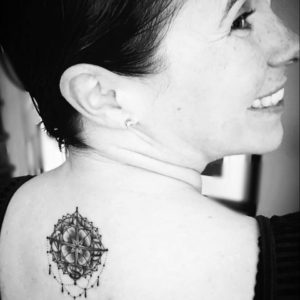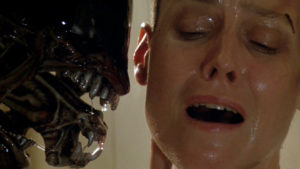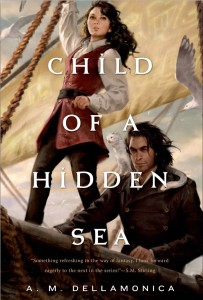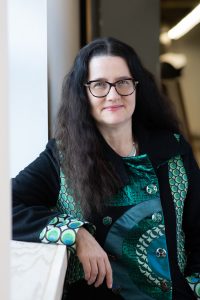 Fran Wilde is the author of the Andre Norton and Compton Crook Award-winning and Nebula-nominated novel Updraft
Fran Wilde is the author of the Andre Norton and Compton Crook Award-winning and Nebula-nominated novel Updraft (Tor 2015), its sequel, Cloudbound
(Tor 2015), its sequel, Cloudbound , newly out from Tor in September 2016, and the novella The Jewel and Her Lapidary
, newly out from Tor in September 2016, and the novella The Jewel and Her Lapidary (Tor.com Publishing). Her short stories appear in Asimov’s Science Fiction
(Tor.com Publishing). Her short stories appear in Asimov’s Science Fiction , Tor.com, Beneath Ceaseless Skies, and Nature. She writes for publications including The Washington Post, Tor.com, Clarkesworld, iO9.com, and GeekMom.com. You can find her on twitter @fran_wilde, Facebook @franwildewrites and at franwilde.net. Here’s what she says about this lovely piece of ink.
, Tor.com, Beneath Ceaseless Skies, and Nature. She writes for publications including The Washington Post, Tor.com, Clarkesworld, iO9.com, and GeekMom.com. You can find her on twitter @fran_wilde, Facebook @franwildewrites and at franwilde.net. Here’s what she says about this lovely piece of ink.
My tattoo is still new enough that I’m not yet thinking about what I’ll get next (everyone tells me that’s coming). I have zero regrets.
Getting a tattoo was something that scared me, because I’d been told all my life that I was pain-sensitive and there’s a lot of discussion about pain thresholds when it comes to tattoos. But this summer, I realized that my fear was much less important than my desire to do something for my body and for me, after a long stretch of having things done to it.
The tattoo is, in part, a tiny bit of crypto, a bit of lotus, and almost all compass rose. Traditionally, the compass rose has a “safe passage over troubled waters” meaning. I wanted it on my spine because that’s the spot that needed celebrating most, and maybe a little bit of protection too.
Trouble was, everyone said that a back/spine tattoo would hurt more than other places. Was I willing to risk it? I didn’t tell many people what I was getting, and I didn’t tell nearly anyone where. Just in case I chickened out.
Turns out, I didn’t chicken out. Nor – to my surprise – did it hurt. I pretty much fell asleep on the table while the tattoo was being done. The inking process (by
Clifton W. Carter Jr.) produced some sort of pain white noise that was more relaxing for me than standing up, or sitting down, due to the pain I’m usually in. I cannot tell you how much this matters.
My tattoo didn’t necessarily change the world’s view of me (or if it did, I haven’t heard / don’t care all that much) as much as it changed my view of me. I know now that I’m not pain-sensitive, for one, and all the people (family, doctors, that one school nurse) who convinced me I was can go jump in a lake.
I know better now that when people tell me I am something — whatever it is –, to examine the whys of their statements, and to decide for myself who I am.
I know also that no matter what, the ink was something I wanted to do and I did it, even though it scared me.
At the beginning of this year,
I declared a map year for me, my writing, everything. At the time, I meant that I’d be exploring new ways of being in the world, and new ways of seeing. I didn’t realize then that I would become my own compass for that journey, and that the trip will continue for as long as I’m standing, or writing.
That’s what the ink is telling me, though, and I’m very excited to head out for new directions.
You can find Fran Wilde at her website, blog, on Twitter, or order her books at Amazon (US), Barnes & Noble, IndieBound and Powell’s.
About this post: Inksplanations (and variations thereon) is the name for a series of short interviews with a number of genre writers about their tattoos. Why they got them, what they mean, how getting ink did or didn’t change them–any and all of these topics are fair game. What drives a literary artist to literally become canvas for an image or epigram? Did they get what they were seeking? I wanted to know, especially after I got my 2016 poppies from Toronto artist Lorena Lorenzo at Blackline Studio, and so I did what any curious writer would do. I asked.
, at its blog. Some of you may have heard me read this chapter… but for those who haven’t, or anyone who wants a refresher, here’s the opening. A taste of a taste, call it.






 One of the other books I reviewed this year was the newest by Connie Willis,
One of the other books I reviewed this year was the newest by Connie Willis, 


 Happy Halloween, everyone!!
Happy Halloween, everyone!!




